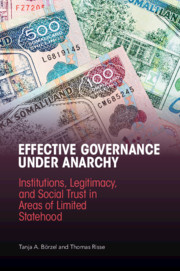 Effective Governance Under Anarchy
Effective Governance Under Anarchy Book contents
- Effective Governance Under Anarchy
- Effective Governance Under Anarchy
- Copyright page
- Contents
- Figures
- Tables
- Preface
- Abbreviations
- 1 Introduction
- Part I Setting the Stage: Concepts and Theories
- Part II Governance in Areas of Limited Statehood: Empirical Evidence
- 4 Who, Why, and How? Actors and Modes of Governance
- 5 Security
- 6 Human Rights, Rule of Law, and Democracy
- 7 Welfare
- 8 Conclusions
- References
- Index
6 - Human Rights, Rule of Law, and Democracy
from Part II - Governance in Areas of Limited Statehood: Empirical Evidence
Published online by Cambridge University Press: 09 April 2021
- Effective Governance Under Anarchy
- Effective Governance Under Anarchy
- Copyright page
- Contents
- Figures
- Tables
- Preface
- Abbreviations
- 1 Introduction
- Part I Setting the Stage: Concepts and Theories
- Part II Governance in Areas of Limited Statehood: Empirical Evidence
- 4 Who, Why, and How? Actors and Modes of Governance
- 5 Security
- 6 Human Rights, Rule of Law, and Democracy
- 7 Welfare
- 8 Conclusions
- References
- Index
Summary
Chapter 6 investigates human rights, the rule of law, as well as participatory institutions. Democratic governance is possible, even if state capacities to enforce rules and decisions are weak or absent. We start by addressing the human rights problematique in areas of limited statehood. Strengthening state capacity might do human rights and the rule of law more harm than good, resulting in autocratic and repressive statehood. We explore the effectiveness of regional organizations (RO) and of (I)NGOs and non-state justice institutions to provide fair and transparent access to justice as a crucial component of the rule of law. They can accomplish these goals, the more their institutional design enables deliberative negotiations through fair and transparent procedures. The remainder of the chapter discusses the effectiveness of companies and rebel groups to engage in human rights and democratic governance. It is one thing to expect from companies to comply with human rights norms. It is quite different to ask them to promote human rights and the rule of law beyond their premises. Rebel groups are more likely to provide effective human rights and inclusive governance, particularly if they require international and domestic legitimacy and if they are faced with trust-based communities.
Keywords
- Type
- Chapter
- Information
- Effective Governance Under AnarchyInstitutions, Legitimacy, and Social Trust in Areas of Limited Statehood, pp. 181 - 214Publisher: Cambridge University PressPrint publication year: 2021
